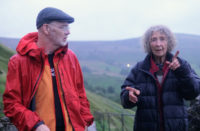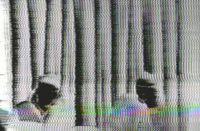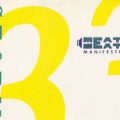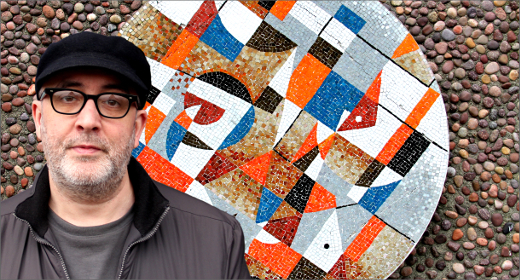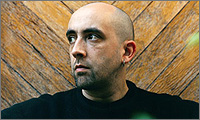
(04.01.08) MEAT BEAT MANIFESTO have always gone above and beyond the edge of electronic music production. Throughout the late 80’s and early 90’s, front man Jack Dangers pioneered a style that inspired generations of followers; a style that blends beats, bass and distortion with rhythms that unfold at every corner. To this day he continues to break new ground. With the forthcoming release of Autoimmune, Jack has literally unfolded (once again) the true definition of dub electronics. As Jack prepares to embark on yet another tour in support of their latest full-length, we take the time to discuss several key elements that define the nature of Meat Beat Manifesto. (The following phone conversation took place on March 26, 2008).
Technology and collaborations
With Meat Beat Manifesto / Jack Dangers and the various projects tapping into many different areas, how would you best describe your progression over the years; would you say that it has changed or is it more of an evolution? “Well, I think it’s definitely an evolution, an evolution of me being able to get my hands on equipment that I would have never been able to get my hands on in the past. Of course, technology is important in electronic music and always has been. There’s always this new, fresh sound, even if you go it in a retro, vintage way, what you can do these days with technology and the gear.. especially live, what you can do with a laptop is pretty unbelievable. We’re running a program a friend of ours put together using Max and it enables us to control video tracks via midi-keyboard. So you know, 20-years ago you could have never done that.” Has this been something that you’ve always wanted to do? “It makes it fun, using new stuff. How can you not like it, you know.. you have fun doing that.” Yes, it’s the full envelope of sound and vision, the whole feeling of your music. “Yeah, you know this tour we’ll be doing now, we’ll have the usual suspects; Lynn Farmer on drums, Mark Pistel and Ben Stokes. The four of us will be on the road once again.” That sounds great, and I’m looking forward to that. “It’s pretty much changed over the years, working with the amount of people I’ve worked with, the revolving door policy.”
Revolving door policy
That’s something else I wanted to get into; this revolving door concept is a great analogy that encompasses the sound of Meat Beat Manifesto. With people coming in and weaving between albums. “Sometimes I get stuck in the revolving door, my head gets thickened out.” Are these friends who basically jam together and you in turn compile and produce them for release? “Well, on the new record, I did all the studio recording in the city at Mark Pistel’s place, he has a studio called Room 5. So, we recorded all the drums there, but everything else was done in my place, where I can get my hands on all my gear, which I would never be able to take with me on tour. With modulars and all, they’re big enough to fill up an entire room!” So, with the studio at Mark’s place, does he have similar equipment to produce with? “Well, he’s got an Arp, Mini-Moog and stuff like that. Basically we also use it for the live work. So yeah, all the drums were recorded there, and I took them back here. I didn’t really mess with the drums too much. My goal is to somewhat make it sound different then the other stuff around at the moment in electronic music. I still work with a real human drummer.”
The human element
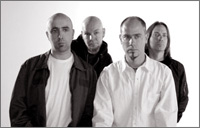
You can really feel this human element in the tracks, even in post-production.. somehow you are able to meld it together and make genre breaking music with it. So it’s the usual suspects, Lynn Farmer on drums; did he do most of the drums? “Yeah, he’s playing drums on most of the tracks. He’s not playing drums on “Spanish Vocoder.” So Lynn will be thumping the drums live, Mark is going to be dubbing them out, and we’re running Ableton Live in here so both of ours cues are somewhat in tandem. Ben Stokes (Dimensional Holofonic Sound) is doing visual samples along with me and Mark will obviously be doing the Moog using a vocoder. I use a lot of vocoder’s in my music. I used it with Storm the Studio and onwards. So, you know, with all that sound a lot of it is improvised. We don’t rehearse it into the ground so that it’s the same way every time we play it, there’s a lot of improvisation still, with music and visuals.”
Creating an identity
I’ve read over the years that you generally like to disassociate yourself from any pigeonholing within a genre. How have you managed to basically separate yourself from these genre tags? “That’s the real identity of the band, it’s the sound coming out. It’s always going to be different than anything else. It sort of makes me go down those roads. The stuff on this record (Autoimmune) could sort of be put in the dub-step arena, but to me we’ve been doing stuff like that right from the get go. There’s even a track on Storm The Studio, “Re-Animate Part 4,” we’re doing that live and it’s the same tempo and BPM, it’s a slowed dub track. Things with basslines and more than that since Perennial Divide, there’s always been elements of stuff like that. I think it’s more like the scene is catching up with what we’ve been doing, like Mick Harris has been doing over the years.” Yes, his new one on Ad Noiseam (Stealth) kind of resembles a similar style although your music has an organic quality, you can hear more of the details in your music whereas with Scorn, I can feel all the basslines, rumbling and the feeling is parallel. “There’s always going to be that thing that creates your identity, so, simply with what I do, it’s always been like that and it always will be. I’d like to go on for another 20 years!”
Punk ethics

There are many different areas we could take this interview. When you started back in the 80’s did you ever think Meat Beat Manifesto would ever go in the direction it has today? Could you imagine that it’d grow so far? “Yeah, I’ve always sort of new it was something special. Not special in a way that it is going to make millions and millions of dollars or anything like that. Special in that it’s doing something. I always sort of knew that. When you’re in a band doing things like me, where you just pick up an instrument when I didn’t have the ability to, bands like Cabaret Voltaire, Kraftwerk (very early on), even early Human League, there was sort of a punk ethic, where you just pick up a synthesizer and make noises, obviously that turned into a whole scene in the 80’s and it’s still going on. I’m sure that between 1973 and 1983, Kraftwerk just had this feeling that they were doing something that nobody else was doing. It was the world that had to catch up with them. It’s so rare to get a band like that and to have commercial success like they did as well. I don’t think there are very many bands like that.”
You mentioned the word special and I think it’s a critical element in your music in that it has a timeless and lasting quality. I can go back and put on Storm The Studio and Armed Audio Warfare, and I still hear more sounds that I’d never heard before. This is going back around 10-years, so there’s definitely a lot of layering and creation where the word special ties in perfectly. “Yeah, I think it’s thread throughout the whole thing, from Perennial Divide to doing things with rhythm and placing basslines over a rhythm which gives it a sort of staccato feel. I’ve always, and am still doing that. It’s all about the rhythm, all about things displacing each other and creating something fresh.”
Beats, bass and distortion
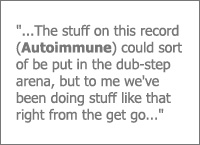
There was a press release recently that quoted you as saying that beats, bass and distortion was your focus for Autoimmune. Can you elaborate a little more on these elements? I’m also hearing an amalgam of all the years of work you’ve done on one album. “Yeah, that’s sort of what I’ve been doing all of these years. Beats, bass and distortion.” And you are definitely bringing it forth on this new release. “Yeah, through the years, I’ve tried to make things sound distorted when they’re not actually being distorted; if that makes sense. I’ve sort of perfected that on this record (Autoimmune). I think that if you just distort the hell out of everything you just end up with a bunch of medley white noise.” I think that what I’m getting from this is that with the different sounds you are using, they work so well together that they create their own distortion. “Yeah, it’s the equipment we use as well, like the EMS, the Synthi ATS and the Synthi 100 has a sound which I suppose gives a British sound because it was in the year that British synthesizer / modular manufacturers back then would just support bands to use their gear through the years. From Brian Eno on to Stereolab, Chemical Brothers, Aphex Twin and Autechre. Actually I don’t think Autechre ever used any EMS stuff, as they seem to be strictly MAX, laptop driven. They’ve sort of come up with patches which do the same sort of thing. It’s all about tweaking the sound and taking it a step further.”
Fly on the wall
Is there anyone you haven’t worked with yet that you would like to have? “Stockhausen, though that will not happen now. That would have been interesting. A friend of mine worked with him and said it was very interesting. He was always a person on that list that sadly is no longer with us. There’s no one on the horizon that I can think of. I would have loved to have jumped into a time machine and go back to recording sessions of artists like Captain Beefheart which was produced by Frank Zappa. I would have loved to have been a fly on the wall for those sessions.” My wife’s father, a Jazz musician (Jay Migliori / Supersax), who passed away in 2001, had an opportunity to play with Frank Zappa and some of the stories I’ve heard are just amazing. “Yeah, he was an amazing musician.”
The politics of music
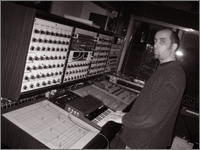
We’ve already mentioned the current lineup for the studio and live work; you have some guest vocalists on this new album. “Well, I’m too white. I like to work with people who have that style of vocal delivery which I could never, ever achieve.” You did it well on the track “Solid Waste.” “Yeah, this album was going to be a double CD until I decided to go for quality rather than quantity. So I just shaved the tracks down to a single CD. These other tracks will sort of see the light of day. Three of these have vocals all the way through them, so they will see the light of day.” Your vocals, or guests? “On the new album the people that did some of the extra vocals, Azeem and Daddy Sandy, they did their thing which I could never achieve. It was just the right thing to do.” You talk about quality over quantity and I go back to Subliminal Sandwich which is an absolute highlight. I listen to the second disc and it sounds just as fresh as it did back in 1996. “I actually did it in ’93.” That was around Satyricon right? “Yeah, Satyricon came out around September ’92 if I remember correctly, and then from September onwards until like April, May when we were touring that record was being created. There were about two months spent working with EBN (Emergency Broadcast Network) on their album (Telecommunication Breakdown), then I started work on what was to be Subliminal Sandwich. We went through a lot of legal blather with our Belgium label we were signed to (Play It Again Sam), so things took longer than they should have, otherwise that album (Subliminal Sandwich) would have come out late ’94, early ’95.” So that’s where the delay came in, the politics of music.
Andy Partridge

As far as your listeners around the world, and your travels around the world with Meat Beat Manifesto, would you say that some of your fans have somehow influenced or inspired anything musically? “I don’t think musically, but definitely to keep me doing it. It’s inspiring to know that people still; that when they hear it, they like the things you are creating. Through the years I’ve met some people who have been inspired to make music and who have come along and made their career out of it.” Well, I would not even be in California if it wasn’t for Meat Beat Manifesto. “I wouldn’t even be here if it weren’t for Andy Partridge of XTC who allowed me to sit in the studio when they were rehearsing back in ’82 when I was working in this recording studio. And just seeing this professional band getting ready to do a world tour more or less destroyed any hope for me being normal, or having a normal job the rest of my life. This was in Swindon, England 1982, January / February. They were getting ready for the English Settlement album which was coming out and they were going to do a world tour, but Andy had a nervous breakdown and he never played live again.” Is this what inspired your guitar works that were incorporated into the Archive Things 1982-1988? “Yeah, Andy produced “Beehead,” one of the Perennial Divide tracks. He did it for nothing and went out of his way to help out on that track. He even went up to London to master it with us, so he went above and beyond the call of duty. I was in Swindon last summer and I bumped into him, he was walking down the street! I hadn’t seen him in about 14 years.” This was a vacation then? “Yeah, this was to go back and see family and friends, so we’ll be doing the same thing in the summer. I will be playing there as well, the album comes out on Planet Mu in Europe, and I know they’ve sorted some dates out already.”
I’ve noticed that the Planet Mu version of Autoimmune contains a different track-listing. Are these two tracks part of the extra tracks from the initial 2CD? “Yeah, the US version has extra tracks and the European version is a little different. It was the whole 2CD thing shaved down to a 1CD. Some of these tracks ended up in different territory.” Version is another keyword and it triggers my sampling question which has been a constant theme in your music.
Cut and paste collage music
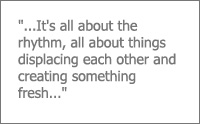
Do you still filter through old television and radio shows, records and such? “Not so much records; it’s always been, for me, about film or television things for me. Like all of the vocal stuff on Storm The Studio onwards where basically it had visuals attached which in retrospect I had to go back and get them for the live shows aspect. That’s where many of these things come from; I’m still doing that. I like the whole pop-art ethic of using something which is already been used before, which is already famous, like the way Andy Warhol and the way all those cats reinterpreted things. Cut and paste collage music. I’m not one of the first people to do it.” I think you’ve really made a remarkable impact on the whole recycling symbol and its definition. “Yeah, I think it’s about an art-form, it’d be easier for me to whisper “It’s In My Brain Now,” but it’s more fun to know it’s from a Revolting Cocks remix than me whispering. The scream on that album is from Clockwork Orange, and that’s another visual attached to it.” It’s just amazing to see that live because what happens during the live shows is a brain explosion with the knowledge of where these audible samples actually come from. “With the theme from Scanners where the head is blown up. I like to use things which people know. We also sampled Michael Jackson on Storm The Studio.” There are so many elements to your music that it becomes a learning experience discovering these samples.
Tape manipulation
On one of your Important Records releases (Loudness Clarifies / Electronic Music from Tapelab) you’re holding what looks like a field recording device, do you still delve in that kind of work? “Yeah, I still mess with tape recorders, and actually there is a CD coming out on Brainwashed.com’s hand-made series, Music For Planetarium. I basically just used tape recorders for that and four different reel-to-reel’s and I would just record stuff onto them really, super slow and bounce them down to the next one slowly so the thing you end up with is so slow it’s gone into different worlds. If you did that with samples or pieces of digital audio, it would go into its individual bits and break up, but with tape it goes into different worlds. The whole thing was done by recording things played really fast and then repeatedly slowed down four times and then I mixed the whole thing on my deck under the starry night just to get the atmosphere right.” It sounds similar to perhaps what you did on the Forbidden Planet Explored 2CD. “That was more of a live thing that was to accompany the film live so the recordings were actually from a festival in France. That was more of a real planned thing, with this Music For Planetarium CD, that was more tape manipulated. I can’t really refer it to anything else, or anything like it.”
VHS collecting

Over the years, with all of the releases you’ve put out, and going back in time somewhat, how do you view albums like Satyricon, Storm The Studio et cetera, do you ever re-listen to these albums? “Well, they are a part of me, but I don’t tend to do that. It’s weird when bits of my songs are played, but I listen to the old stuff when someone else puts it on.”. Are there any plans for a follow-up to Archive Things 1982-1988? Yeah, possibly. We’re talking about doing that with all of the live versions and things that didn’t quite make it out, B-sides, remixes which didn’t see the light of day.” One track I’d love to see fully released if it hasn’t been released already, is the live version of “God O.D. (oriental version?)” –which may have come out on the Live ’05 CD. “Yeah, well the version we’re doing of that live is more like the original version. Once again we’re sort of changing pace and I don’t intend to stick to doing the same thing over and over again. You’ll be surprised. It’s funny you see that as an oriental version, and I see where you’re getting that from, but the actual sound that sort of makes it feel that way is from a 60’s psychedelic record, California Poppies. That’s one for the crate diggers.” So are you still going out to find these rare records? Yeah, I’ve sort of become more selective. I primarily collect electronic records from around 1980 at this point. The whole historical thing of musique concrète and electronic music in Germany and I’m sort of finding these odd releases here and there that I did not know even existed. And that’s sort of the part of the fun I’m talking about. I’ve moved on from the days of going to a record store and digging through so many records, I’ve sort of done that. I’d rather do that with visuals with my old VHS collection and stuff like that. Going to swaps and not looking at records but coming out with VHS tapes.”
Digital media
With the medium that contains visual or audio, what do you think about the digital element of releasing music with stores like Bleep.com that release a digital version of your new album? “Well, it’s the ease of it, that’s what I like about it. Being able to visit iTunes and download music is definitely cool, the more you can spread the word the better, so for me it’s all good. I found out today that it’s similar to the way record label’s work, it’s like territories, so iTunes does the digital release and it will be available on iTunes only here (US) and in Canada, but not in New Zealand. Until it’s sorted out there’s all this red tape which is starting to reappear again which seems to be what the music industry was like.” You’re correct with the ease of accessing digital media, and with MBM the quality has always been a high standard. The problem that I’ve noticed is that the good stuff is hard to find these days. Do you think that the age of producing music has become too easy? “For sure; the idea of publishing your music, burning CD’s and sell them. You don’t have to go through all the steps to manufacture a product and multiply. It’s the idea of the digital release, there it is, download it. You don’t have to keep reproducing it. There’s always going to be something special about vinyl, it’s timeless. I’m the same with tracking down vinyl.” Is there still a great amount of record stores in and around San Francisco that you frequent? “Well, whether it’s on eBay or in a record shop, I find them either by getting on my knees or on eBay.”
Tiles in Thailand
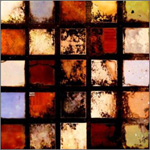
I’ve been listening to Autoimmune for several weeks and you have a single out now (Guns N Lovers) which you’ve done a great job on. Congratulations on this new release, you’ve certainly outdone yourself again and you just never know what to expect with a Meat Beat record on the verge of coming out. How do you feel about Autoimmune? Did you have Richard Borge on artwork again? “Yeah, he did the artwork on this one. I came out with all of the images and handed it over to him to do his thing. So yeah, I came up with all of the visuals for it, pictures and stuff, closeups and such.” The cover has an acidic, almost melted look to it. “That’s a good way of looking at it, it’s actually a photograph, it’s practically an untouched photograph of rare tiles on the ground in Thailand. It’s hard to really describe a block of squares, it’s just there.” It’s an image I’ve come up with and given to Rich, maybe next time I’ll finish the job myself.”
Tino will be back
How’s Tino Corp. going these days? Are we still going to see releases lined up in the future? “I’ve been busy doing this record and Ben has been busy traveling around the world with Brainfreeze for their tour and he’s recently worked with DJ Shadow so we’ve both been very busy. We’ve got some releases by the end of the year, but nothing for the next few months.
I’m looking forward to the live show in Los Angeles (4/12, El Ray Theatre). It looks like you have a pretty busy tour schedule planned. “I think there might be some more near the end, in the Bay area. That’s pretty much it, and then we’ll be doing some other shows around the world and I’m sure by the time we get back here we’ll be doing more.
Anything else you’d like to mention, insights, inspirational words for your listeners? Meat is murder, don’t have any part of it I say!”
::..:::…..:..::….:::::..:::..:::::::……:::…::.:::….::::..:..:::…::…….:::::
Autoimmune is out now on Metropolis (US) and Planet Mu (UK). [Purchase]
For tour date information, visit meatbeatmanifesto.com.







